Caring for your oral cavity is an important process, because healthy teeth are the key to fresh breath and a beautiful smile. For this purpose, people use, in addition to the usual means, a new device called an irrigator. Better results can be achieved with this device. But what is an oral irrigator? What is it for? How to use it? Let's figure it out!
What is it and why is it needed?
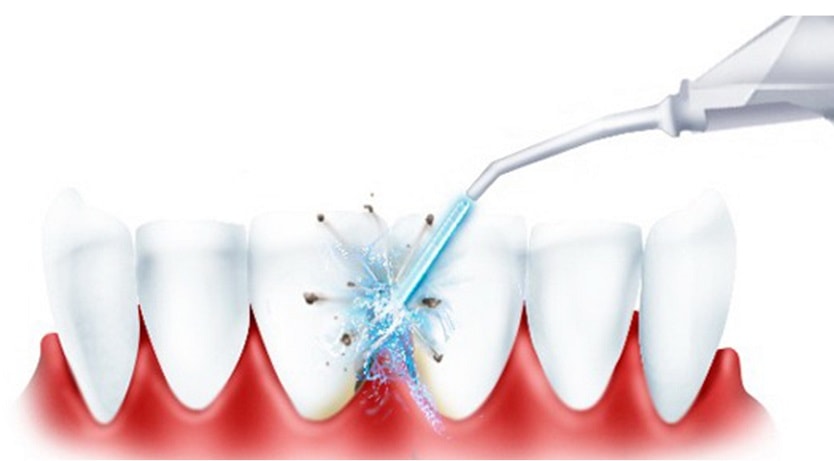
The irrigator does not replace a toothbrush, but is an additional device for caring for the oral cavity. To the question: “What is an oral irrigator for?” We will answer simply - for a more thorough dental care.
When purchasing an irrigator, you do not need to remove the brush. It can be used to clean hard-to-reach places in the mouth, braces, crowns and implants. It helps to get rid of tartar and is used to prevent diseases of the teeth and gums. But this does not mean that you can forget about visits to the dentist, because only a specialist can diagnose and choose the right treatment.
The irrigator is used for:
- Ensuring maximum hygiene at home.
- Prevents the development of diseases of the oral cavity.
- Prevents bacterial growth and tooth decay.
- Provides high-quality cleaning of the entire oral cavity.
Irrigators are of several types:
- Stationary - connected to the mains.
- Portable - they are small in size, equipped with a container for liquid and a battery for work.
- Connected to the water supply system - they are connected using adapters to any type of taps, and water flows into the device continuously. Doctors do not recommend using this type of unit due to the questionable quality of water in the water supply system.
![]() See also - Oral irrigator - what is it?
See also - Oral irrigator - what is it?
Indications and contraindications
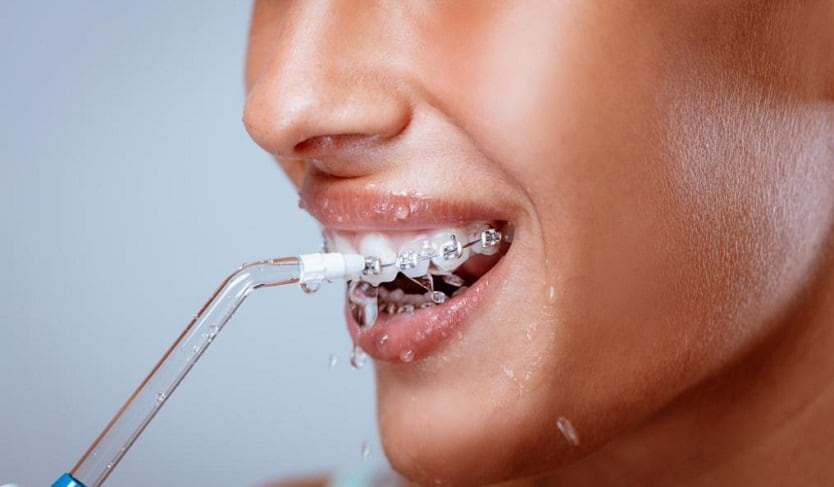
Irrigators are used in such cases:
- Crowded teeth.
- For inflammation, treatment and prevention of diseases in the mouth.
- In order to get rid of bad breath.
- With diabetes mellitus, which prevents the rapid healing of soft tissues.
- Caring for braces, crowns and implants.
- Pregnancy, in order to ensure the necessary oral hygiene and prevent disease.
Contraindications:
- Recent operations on the mucous membrane.
- Treatment by the dentist.
- Diseases of periodontal tissues;
- Constant bleeding of the gums after using the irrigator for 14 days.
According to experts, all contraindications are temporary. And it is also necessary to closely monitor the child if he uses an irrigator, so as not to accidentally choke on the jet of water.
![]() See also - Portable oral irrigator Revyline RL 200 XL VS Waterpik 450
See also - Portable oral irrigator Revyline RL 200 XL VS Waterpik 450
What liquid can you use
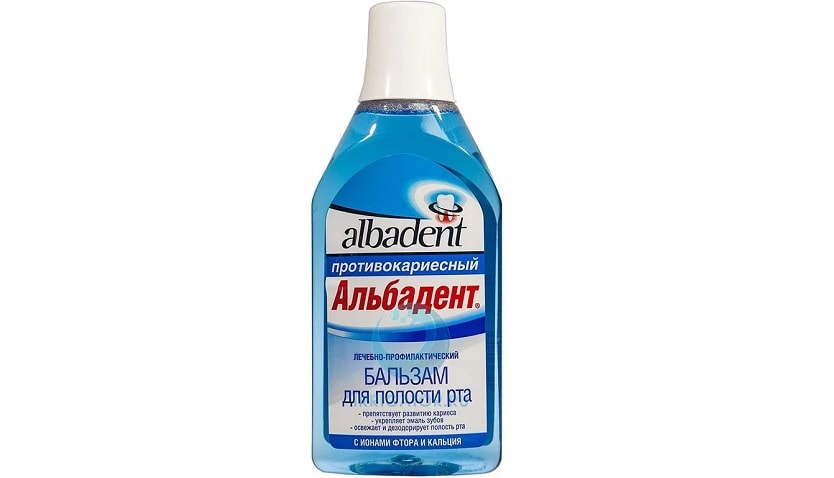
Use boiled or filtered water. Failure to follow the rules can cause infection or damage the device. You can rinse your mouth with decoctions of herbs, but before that you need to get the advice of a specialist, because such decoctions are not suitable for everyone.Also, particles from the tincture can get inside the device and disable it.
The liquid poured into the irrigator should be at room temperature. This condition must be met, because warm water will be most comfortable for the oral cavity.
If the instructions do not strictly indicate that you need to use clean water, then you can add a little mouthwash to it, which will have a positive effect on your teeth and gums. After use, rinse the irrigator thoroughly.
To prevent diseases and treat the oral cavity, use ready-made liquids that include:
- Miramistin is an antibacterial and antifungal drug.
- Fluoride compounds - protect tooth enamel.
- Medicinal plants - relieve inflammation, fight against bad breath.
- Chlorhexidine is an antiseptic. It overdries the mucous membrane, so it cannot be used every day.
Popular irrigator products:
- Albadent - normalizes the level of acidity in the oral cavity, it contains plant extracts, and is able to heal minor lesions on soft tissues, helps in the prevention of caries and periodontal ailments.
- Irix - consists of fluorides, alum, potassium citrate and miramistin, provides protection for teeth and gums.
- Professor Persin - made from herbs, contains chlorhexidine and is an antiseptic.
How to use the irrigator
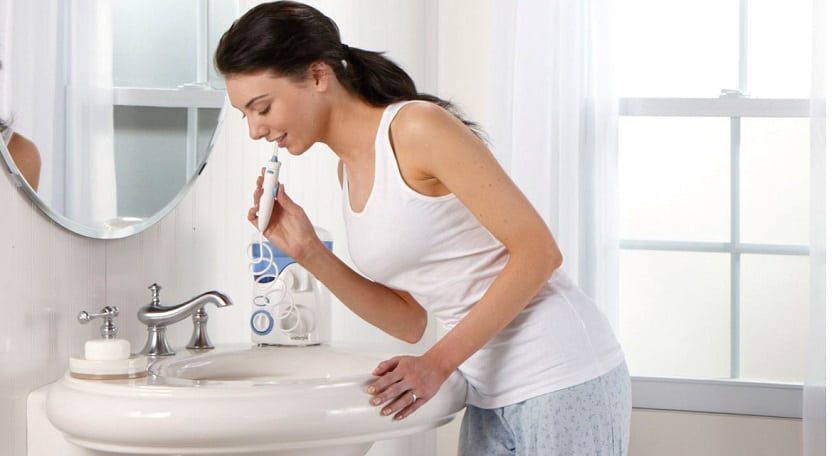
Before use, consult your dentist about the fluid you are using and how often you can use your oral irrigator.
Brush your teeth before using the irrigator. The device cannot be a complete replacement for standard oral cavity treatment, it is intended for additional hygiene. The cleaning process should take 15 minutes.
During the operation of the irrigator, it is important to pay attention to the gums, the liquid must be directed from top to bottom. These simple steps can help you avoid gum injury. Read the instructions before using for the first time, it will help prevent soft tissue damage.
Cleaning the oral cavity should begin with a minimum pressure, which should be gradually increased. Such manipulations will help the gums and teeth to adapt to the procedure and avoid discomfort.
Cleaning should start from the front teeth of both jaws and gradually work towards the back teeth, which need to take more time during brushing. In these places, the toothbrush does not do its job well and accumulates the greatest number of microbes there.
Before using the irrigator, you must not clean the interdental space with dental floss, because it can damage the gums, and after using the device, it will only worsen the situation.
If we talk about the settings of the device, then they may include:
- Switching operating modes.
- Change in the number of pulses per minute.
- Pressure control.
- Self-shutdown after a certain time.
How to use the irrigator correctly:
- Fill the device with liquid.
- Install the most suitable attachment.
- Start cleaning at minimum pressure.
- Before turning on the irrigator, place the installed nozzle in your mouth.
- Turn on the irrigator.
- Direct a stream of liquid at the base of the tooth.
- To clean the gums and interdental space.
- At the end of the cleaning process, turn off the device and discard the remaining liquid.
How often can you use
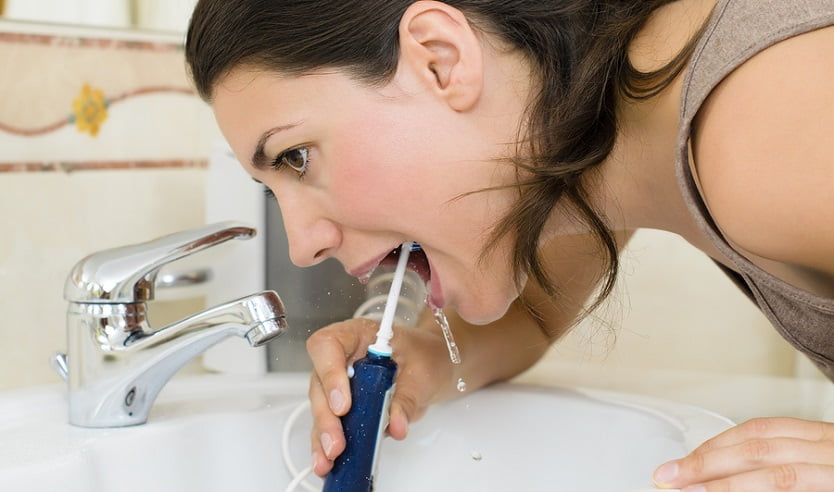
According to experts, the frequency of use of irrigators depends on several factors: for what purpose it will be used, the type of device. If you will be using it for the prevention or treatment of various diseases of the oral cavity, then you need to consult a dentist. The doctor will determine the frequency of use of the irrigator and the fluid used.
In order to keep the teeth and gums cleaner, it is necessary to apply it about 4 times a week. If the irrigator is applied correctly, it can be used more often.
If you care about the cleanliness of your teeth and gums, as well as about the health of the oral cavity, then this device will be a godsend for you.
See also:

